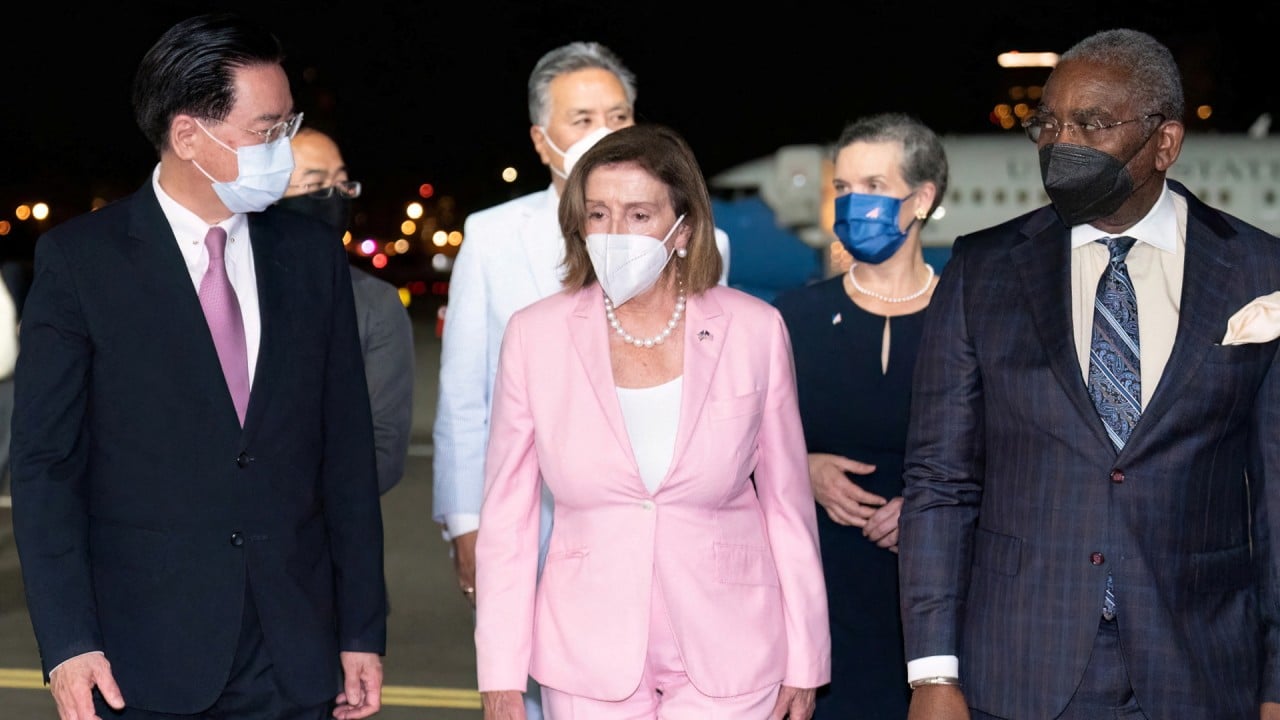
04:57
US House Speaker Nancy Pelosi arrives in Taiwan as Beijing announces live-fire military drills

US House Speaker Nancy Pelosi is expecting her visit to Taiwan to prompt more foreign politicians to follow her example, following reports that a group of British parliamentarians are planning to visit by the end of the year.
“In terms of our visit here and if that would lead to other visits, I certainly hope so,” Pelosi said in Taipei on Wednesday.
“I just hope that it’s really clear that while China has stood in the way of Taiwan participating and going to certain meetings, that they understand that they will not stand in the way of people coming to Taiwan.”
On Tuesday Chinese ambassador to Britain Zheng Zeguang said there would be “severe consequences” if members of the House of Commons foreign affairs committee visited the island, following reports a trip was planned for November or December.
“Whether it is the so-called helping Taiwan defend itself or sending parliament members to Taiwan, [these actions] will seriously violate the one-China principle and the provisions of the Sino-British Joint Communique, and be seriously interfering in China’s internal affairs,” Zheng said. “The British are clear about this.”
Pelosi’s trip may particularly buoy Washington’s allies outside Asia to follow suit, according to Andy Mok, senior research fellow at the Centre for China and Globalisation, a leading non-governmental think tank in China.
“Unless forcefully and decisively countered through military or other means, [Pelosi’s visit] could also embolden others to further undermine China’s efforts to reunite both sides of the Taiwan Strait,” Mok said, adding that countries such as Australia and Britain may seek a confrontation “to bolster American hegemony”.
The United States recognised Beijing as the “sole legal government of China” when it established formal diplomatic relations in 1979 and since then has only maintained unofficial diplomatic relations with Taipei.
Pelosi, as the second in line to the presidency after the vice-president, is the highest ranking US politician to visit Taiwan since her Republican predecessor Newt Gingrich in 1997.
Chinese Foreign Minister Wang Yi said her trip “seriously violates the one-China principle, maliciously infringes on China’s sovereignty and blatantly engages in political provocation”.
Beijing’s response to Pelosi’s trip, if “extremely strong and tough”, will deter others from doing the same, according to Toru Horiuchi, a global studies lecturer at the Chinese University of Hong Kong and a former research fellow at the Japanese consulate in Hong Kong.
“If such ‘provocations’ damage peace and stability [in the Taiwan Strait], then those visits might be regarded as counterproductive,” Horiuchi said.
“If this potential visit promotes similarly high-level visits from other states, China would probably use all its policy instruments, such as diplomacy, economic statecraft, and military power to persuade or, if necessary, coerce relevant states not to ride on such an effect and damage China’s core interests.”
Koji Haraguchi, a political science lecturer at Japan’s International College of Liberal Arts, said the possibility of Pelosi’s visit having a ripple effect on Japan was low.
“If the Japanese government should send high level officials to Taipei, the Japanese-Chinese tension in the East China Sea will be further intensified,” Haraguchi said. “[But] the Japanese government is not ready for military escalation in the East China Sea.”
But if officials in other countries followed Pelosi’s lead, the region would become increasingly unstable, Haraguchi added. “Official visits, because of their public nature, will give [Beijing] more reasons for taking military actions, rather than deterring them. [They] need to react,” he said.
China’s economic influence in the region will also deter other countries in East Asia, which are “chiefly concerned with their own development and other domestic issues”, according to Austin Strange, assistant professor of international relations at the University of Hong Kong.
“Despite recent political and economic friction, China is still an important economic partner for most countries, and commercial ties with China could disincentivise this type of provocation, unless there is strong domestic support for it.”
Horiuchi said “self-imposed restrictions” countries had put on their relations with the island had weakened.
These include decisions by more European and Japanese delegations to make stopovers on Taiwan and the passage of the US Taiwan Travel Act, which allows the island’s president to visit the US in her official capacity.
“I believe this trend is likely to continue in the future,” he added.
Horiuchu said a conflict between the US and China was unlikely, but if that happened almost all the countries with former security treaties with Washington, such as Japan, Britain and Australia, “would see their respective national interests better served by supporting the US rather than China”.
“Unlike in Europe where members of Nato are obliged to take collective actions if one member is attacked, America’s Asian allies have not legally committed to each other on security,” Haraguchi said.
“Thus I expect less coordinated reactions to the regional contingencies by Five Eyes members [the US, Britain, Canada, Australia and New Zealand] than those in the Ukraine crisis by Nato members.”
Kalvin Fung Ka-shing, an international relations researcher at the Chinese University of Hong Kong, said most neighbouring states would prefer not to choose sides.
“Southeast Asian countries have been rather consistent in trying not to be entangled in the Sino-US rivalry over the previous decades,” Fung explained.
“But if these tensions are going to spill over to the South China Sea, then it seems inevitable that some of the claimant countries in the Association of Southeast Asian Nations, such as the Philippines and Vietnam, may be more worried about the scenario.”